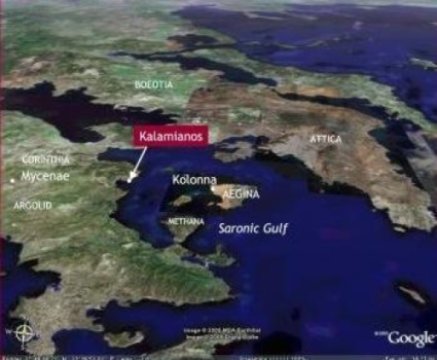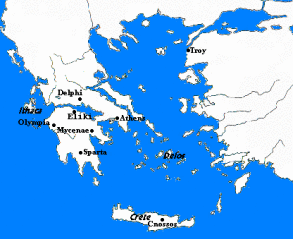Atalanta
Wilk, Stephen Richard
Stephen Richard Wilk has written an extensive blog(a) on the place of Atlantis in popular culture in the 19th and 20th centuries. He reviews many of the early fantasy books that used Atlantis as a backdrop before moving on to a more in-depth look at the musical play, Atalanta, by Sir Gerald Hargreaves and George Pal’s movie, Atlantis, the Lost Continent.
(a) https://srichardwilkcom.wordpress.com/atlantis-the-lost-continent/
Heupel, DuWayne
DuWayne Heupel is the author of Atlantis in Context[1230] in which he concludes that the Atlantis story was an invention by Plato to promote his concept of an ideal form of government and “demonstrate the dangers of national hubris.” However, it would seem to fail as a morality tale when Plato also included the demise of the ‘righteous’ Athenians in his narrative. This is compounded by his reference to another ideal city, Magnesia, in Laws. Why did he need to create two model cities?
Nevertheless, Heupel includes a lot of historical background to Athens and the people referred to by Plato, although by his own admission, he does engage in some speculative conclusions. He also claim that elements in Plato’s story were possibly inspired by real places, like Carthage, Atalanta and Thera and real events such as the Persian and Peloponnesian Wars. What I find strange about that is that the places listed by Heupel are not mentioned at all by Plato, but locations, such as Tyrrhenia and Libya, which are included in the text, are apparently not considered to be relevant by Heupel. It seems clear that Heupel accepts that there are actual historical underpinnings to the Atlantis story, but in my opinion has chosen the wrong ones.
The late Anthony N. Kontaratos, listed twenty-two direct and indirect instances, in Timaeus and Critias, where Plato has asserted the truthfulness of the Atlantis story. As far as I’m aware, there is nothing comparable with this anywhere else in Plato’s writings. This alone should persuade listeners/readers that at least Plato believed he was transmitting a true story. However, Plato did have some reservations regarding details in Solon’s narrative, as expressed in Critias 118c-d. If Plato had invented the whole story, it is highly unlikely that he would create exaggerations in an invented tale and then draw attention to them, unless, of course, he was engaging in a double bluff! For my part, I believe that this is highly improbable and that his reluctance to blindly accept all that was transmitted to him was outweighed by the trustworthiness of Solon, his source. Solon was held in such high regard by the people of Athens that for a writer to invoke his name as an informant, without good reason, would be committing literary suicide. This would be similar to unjustifiably quoting George Washington or Nelson Mandela. It is equally improbable that Plato would invoke the names of his family in support of a hoax.
Therefore, it is not unreasonable to assume that Plato, in good faith, wrote down the story of Atlantis as recorded by Solon. Unfortunately, trust in Solon is not enough to explain away the difficulties in the narrative, including the very item that raised the initial doubts in Plato’s own mind.
For my part, I believe that the balance of probabilities favours the acceptance of the reality of Atlantis and is clearly worthy of continuing research.
Sceptics *
Sceptics regarding the existence of Atlantis have been around since the time of Plato. The first such critic was assumed to be Aristotle, a pupil of Plato’s, who apparently denounced the Atlantis tale as an invention. However, this presumed scepticism of Aristotle has now been seriously challenged by Thorwald C. Franke in a 2012 book, Aristotle and Atlantis[706] specifically dealing with the subject. Nevertheless, Aristotle does record the existence of a large island in the Atlantic known to the Phoenicians as Antilia, inadvertently supporting Plato’s story(i).
Franke has recently outlined the extensive support for the existence of Atlantis from the earliest times in his recent German-language book[1255]. He has followed that with a YouTube video(j) in which he relates how scepticism became more extensive in the 19th century.
Sprague deCamp was probably the most quoted Atlantis sceptic of the second half of the 20th century. He offered the blunt declaration that Plato concocted the whole story, basing the tale on a mixture of the wealth of Tartessos in Spain, and the destruction of the Greek island of Atalanta all intermingled with the mythology of Atlas.
One of deCamp’s most quoted extracts is that “you cannot change all the details of Plato’s story and still claim to have Plato’s story.” While I fully endorse this comment, I must point out that there is a difference between changing and interpreting details. For example, when Plato refers to Asia or Libya, even deCamp accepted that in Plato’s day ‘Asia’ was not the landmass we know, stretching from the Urals to Japan, but interpreted Plato’s ‘Asia’ as a reference to a much smaller territory [0194.27].
Many modern commentators believe that in the interests of dramatic effect Plato heavily embellished the core truth underlying the story, namely that of an ancient submerged civilisation.
A claim frequently put forward by sceptics was echoed by Ian Alex Blaise, who wrote(l) that “we can summarise the ‘Timaeus and Critias’ as a parable of good (ancient Athens) triumphing over evil (Atlantis).” This, however, would appear to run counter to Plato’s narrative that records that both vanquished and victorious armies were destroyed, which is not what you would expect from a morality tale.
Commenting on the suggestion that the story of Atlantis was intended as a morality tale Eberhard Zangger noted that “the description of the natural disasters also contradicts the occasional speculative conjecture that Plato did not mean to illustrate the ideal state with Atlantis, but with archaic Greece. After all, he says Atlantis was punished for its gradual moral decline by being destroyed (Vidal-Naquet, 1964). But if the story is supposed to be a moral parable, why is the “good” Greek side first punished with natural disasters? And why does Plato mainly describe the “barbaric” enemies instead of the old Hellenic civilisation? The traditional attempts at interpretation offer no answers to these questions.”(o)
Another critic, Joe Garcia, offers a paper attacking both the Minoan and Spanish location theories(m).
However, when we consider modern sceptics we find that they have been provided with unlimited ammunition by the poor scholarship of many Atlantis supporters and the outright ravings of the likes of Blavatsky, Steiner, Cayce, and a profusion of other authors, who claim to have channelled information regarding Atlantis.
Edwin Ramage, in his essay[522] on Atlantis, makes the interesting comment that “believers tend to overshadow the sceptics for the simple reason that a positive theory, whether it is simple or elaborate, tends to be more attractive and to make better reading than any attempt at refutation, no matter how well taken it may be.” This is probably akin to referenda questions being framed by governments in a manner that favours a Yes vote that will provide the outcome that they want. This is because most people prefer to say Yes rather than No.
However, if the Atlantis narrative has any truth in it, the legitimate criticisms of sceptics must be given due consideration. One such sceptic is Paul Jordan who has produced a highly critical work[418] on the subject. Jason Colavito is another vocal non-believer and has written a considerable amount on the subject(d). Several other websites(b)(c)(e) can also be recommended, in particular, a seven-part offering by Pat Linse(b).
I recently came across a sceptic review of Atlantis theories by Justin Spring which I thought contained some novel views and although I totally disagree with his conclusions, I feel it should be given a reading(g).
While I expect that few sceptics will be reading this entry, I would recommend to anyone a paper by Karla Mclaren, a former New Age ‘believer’ who developed into a sceptic(f).
A 2015 survey by the Chapman University of California was repeated in 2016, which suggested that nearly 40% of Americans believe that an advanced prehistoric civilisation, such as Atlantis, existed, causing consternation among sceptics(h). Why they found it so depressing is hard to understand since popular belief is no guarantee that it is supported by reality. After all, it was once commonly thought that the sun revolved around the earth!
There are times when I regret that I have not had a university education and then along comes a qualified academic who manages to remove any such feeling. One of those is Seth Stein, a professor at Northwestern University, who specialises in plate tectonics, who was reported in early 2018(k) to have proposed that “one of the strongest reasons to dispel Atlantis as a true ancient civilization is the fact that we haven’t found it.” This asinine comment shows a total abandonment of critical thinking because he seems to think that because something has not been found, proves that it does not exist. For example, before Heinrich Schliemann, Troy did exist but had yet to be located. Professor Stein’s stupid statement is also built on a flawed understanding of what Plato said or more correctly, did not say. Plato never described Atlantis as a continent, as assumed by Stein and it can be reasonably argued that our Atlantic Ocean where he sought Atlantis was not the Atlantic ‘Sea’ referred to by Plato. I suggest that Stein sticks to earth sciences and leave Atlantis to others.
In October 2021, Franke published an essay on what he calls the ‘dark side’ of Atlantis scepticism, which offers an interesting overview of anti-Platonism since the time of the philosopher(n).
Earlier this year (2024) Franke also drew attention to an instance of Plato being seriously misquoted that had its origin in 2001 in the Skeptic Junior article “The Search for Atlantis”, in the Skeptic magazine Vol. 8 No. 4 (Winter 2001), page 96, authored by a certain Pat Linse (mentioned above). “The wrong quote is this: ‘We may liken the false to the true for the purpose of moral instruction.’
Plato never said this. And the meaning of this sentence runs counter to all of Plato’s intentions. It sounds, as if something false would be depicted as true, in order to teach a moral lesson. – The basis of this wrong quote may be the following real quote from The Republic II 382d: ‘owing to our ignorance of the truth about antiquity, we liken the false to the true as far as we may and so make it edifying.’ (Translation Paul Shorey)
The meaning of this real quote is the opposite of the wrong quote: In case we do not know the truth itself, we have to approach with our partially false knowledge towards the truth as much as we only can, and work with this hypothesis until we know better. This is of course a basic principle of rational thinking and science, until today.”(q)
I would not suggest that the original distortion was deliberate but it is disappointing that it was so widely adopted by other sceptics without question. Of course, I am fully aware that some overenthusiastic Atlantis fan have also tried to manipulate texts to accommodate their beliefs.
Some years Rod Martin wrote a short paper(p) in which he grades the arguments of a number of the better known Atlantis sceptics, such as, Kevin Christopher and Michael Shermer.
(b) Skeptic » Junior Skeptic » The Search for Atlantis (issue #10)
(c) The Wild Side of Geoarchaeology Page (archive.org)
(d) https://searchatlantis.blogspot.com/2007/08/atlantis-mu-and-maya.html
(e) https://web.archive.org/web/20190530104546/https://www.skepticssa.org.au/html/atlantis.html
(g) https://scyllasoulspeak1.blogspot.ie/2011/06/atlantis-what-was-plato-really-up-to.html
(i) Strabo, II, 102 and XII, 598. Cf. Proclus In Timaeum 61a (Diehl I, p. 197).
(j) https://www.youtube.com/watch?v=HF62FLucvQk
(l) https://www.oocities.org/debunkinglc/atlantis.html (link broken)
(m) https://www.academia.edu/8064249/Did_Atlantis_Exist
(n) The Dark Side of Atlantis Scepticism – Atlantis-Scout
(o) Wayback Machine (archive.org)
(p) Mission: Atlantis, by Rod Martin, Jr. — Grading the Skeptics (archive.org)
(q) https://www.atlantis-scout.de/atlantis_newsl_archive.htm (Newsletter 217) *
Atalanta
Atalanta was a relatively insignificant island that according to Thucydides (II, 32) was “lying off the coast of Opuntian Locris”. The Athenians built a fort there in 431 BC and following an earthquake it suffered an inundation that caused serious loss of life and destruction of property (III, ChapXI par.89). The island is known today as Talandonisi. In this same area, North West of Athens, we have still the town of Atalanti and the Bay of Atalanti.
 This report of the flooding of Atalanta is sometimes taken out of context by some supporters of Plato’s Atlantis and presented as a clear reference to it. This superficial interpretation does not stand up to scrutiny in terms of date, location, size, nor importance.
This report of the flooding of Atalanta is sometimes taken out of context by some supporters of Plato’s Atlantis and presented as a clear reference to it. This superficial interpretation does not stand up to scrutiny in terms of date, location, size, nor importance.
Others, such as Sprague de Camp, maintain that Plato’s Atlantis is pure fiction inspired by the destruction of Atalanta ‘in a single day’ by a flood following an earthquake. However, it would appear foolish to concoct a story such as that of Atlantis and base it on an inconsequential island, located only 50 miles from Athens, with a similar name, destroyed a few years previously and still expect it to be believed as true.
*Others claim that the sudden flooding of Tiryns (Zangger) or Helike prompted Plato to incorporate an inundation in the Atlantis story!*
A similar Mycenaean city with a sunken harbour, tentatively named Korphos-Kalamianos on the Saronic Gulf, 60 miles south-west of Athens, has recently been excavated.
In 2014, work began on the exploration of another sunken Bronze Age coastal village at Kilada Bay, also in the Argolic Gulf. The team of Swiss and Greek archaeologists returned to the site in 2015, revealing their discoveries in August of that year(a).
Acording to Apollodorus and John Lemprière, Atalanta was the name of the only female Argonaut!(b)
> (a) Bronze Age Greek city found underwater (archive.org)<
(b) https://en.wikipedia.org/wiki/Argonauts#The_crew_of_the_Argo
Helike *
Helike (pronounced he-LEEK-ee) was an ancient Greek city in Achaea, which was submerged by an earthquake and accompanying tidal wave in the winter of 373 BC.Strabo describes Helike as being 12 stades distant from the sea (geog.8.7.2)(g). The same event also destroyed the city of Boura located southeast of Helike(h).
tidal wave in the winter of 373 BC.Strabo describes Helike as being 12 stades distant from the sea (geog.8.7.2)(g). The same event also destroyed the city of Boura located southeast of Helike(h).
In 1988 the Greek archaeologist Dr. Dora Katsonopoulou and Dr. Steven Soter established the Helike Project(a) with the aim of locating the lost city. Katsonopoulou grew up just a few miles from the Helike site and would have been fully aware of any local stories regarding its destruction. It took until 2001 before their excavations were successful. Fortunately, a BBC Horizon team was on hand to record the event and have made a transcript of the transmission available on the Internet(b). The work has continued every year since then. It is worth noting that during the excavation of the town, an even earlier Bronze Age settlement was unearthed nearby that may have greater significance than Helike itself.
The Helike/Boura disaster took place just a few years before Plato wrote his Timaeus and Critias dialogues, which are believed to be among his last compositions, dated 355-347 BC(c). Frank Joseph erroneously claims that Plato could not have been influenced by the Helike disaster, because according to Joseph the Atlantis dialogues were written 25 years before the obliteration of Helike [1074.14]. Coincidentally, there was another Greek inundation following an earthquake during Plato’s lifetime at a place with the evocative name of Atalanta!
 One suggestion is that Plato had been aware of Solon’s story for some time but with the dramatic destruction of Helike he found that the story of the destruction of Atlantis would be more credible if given a similar demise.
One suggestion is that Plato had been aware of Solon’s story for some time but with the dramatic destruction of Helike he found that the story of the destruction of Atlantis would be more credible if given a similar demise.
Katsonopoulou contends that this disaster was the inspiration for Plato’s story of the destruction of Atlantis and presented a paper to the 2005 Atlantis Conference [629.327], outlining her views. Although she is seen as the champion of the Helike-Atlantis theory she was not the first to suggest a possible connection.
The British philosopher A.E. Taylor (1869-1945) was probably the first, in 1928, to consider the destruction Helike as a template for the demise of Plato’s Atlantis[638]. This idea was endorsed(f) a couple of years later by the French writer Perceval Frutiger[639] and in the 1980s, Professor Adalberto Giovannini(d), a Swiss historian as well as Phyllis Young Forsyth both viewed the Helike event as having had some influence on Plato’s narrative of the Atlantis story.
(b) https://www.bbc.co.uk/science/horizon/2001/helike.shtml
(c) https://web.archive.org/web/20240627222643/https://iep.utm.edu/plato/
https://web.archive.org/web/20240627222643/https://iep.utm.edu/plato/
(d) https://historyandsoon.wordpress.com/2015/10/22/uncovering-the-lost-city-of-helike/
(e) THE ATLANTIS HYPOTHESIS: Searching for a Lost Land, International Conference Atlantis 2005, 11 – 13 July 2005, Milos Island, Greece,Atlantis milos: Abstracts (archive.org) (abstract only)
(f) http://www.geoprobe.org/helike/atlantis.html
(g) Strabo, Geography, Book 8, chapter 7, section 2 (tufts.edu)
(h) https://en.wikipedia.org/wiki/Bura_(Achaea)
